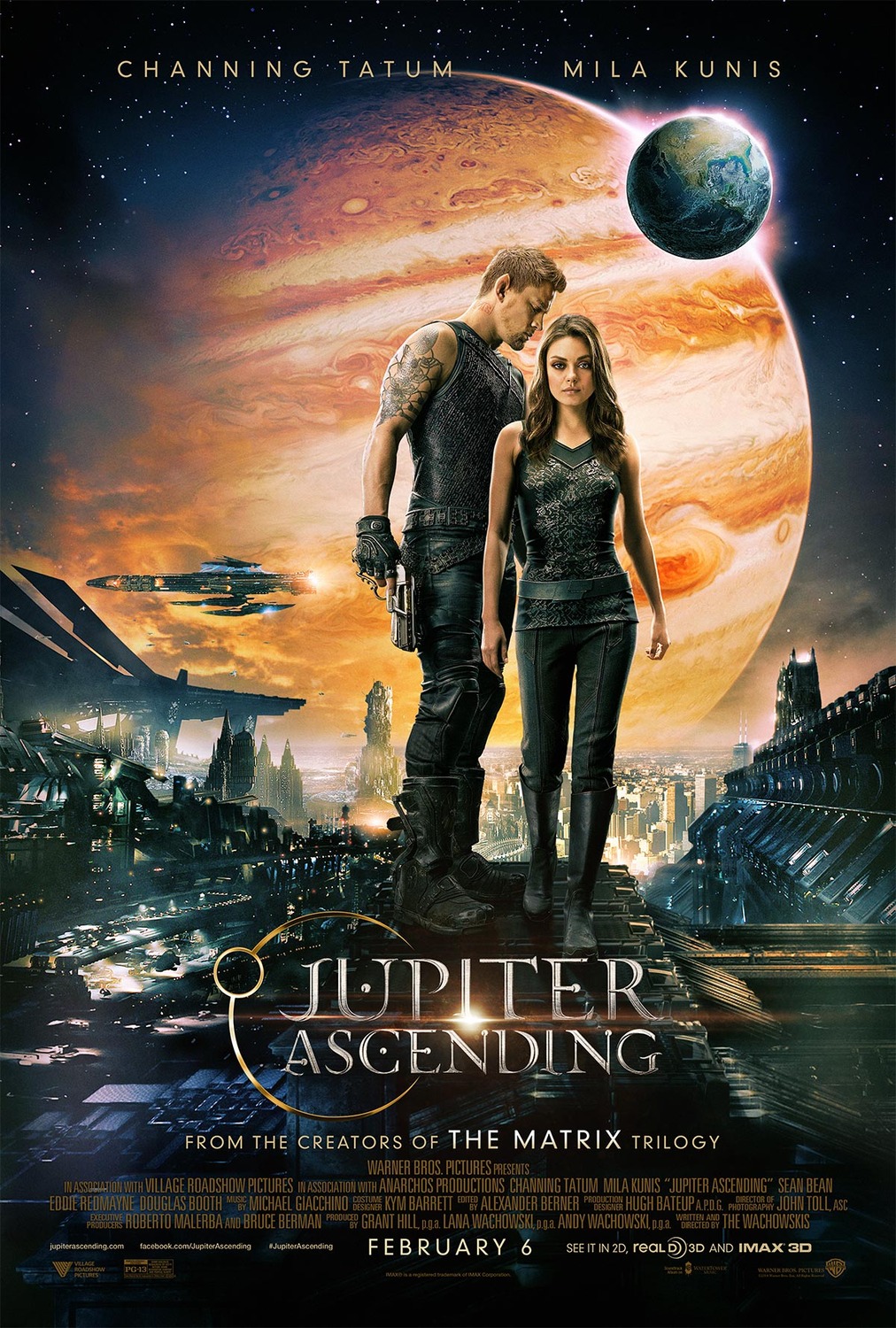 After a six-month delay, the Wachowskis’ latest science fiction epic has hit theatres. Was it worth the wait? That depends on your suspension of disbelief.
After a six-month delay, the Wachowskis’ latest science fiction epic has hit theatres. Was it worth the wait? That depends on your suspension of disbelief.
A young woman (Mila Kunis) learns she is a member of an intergalactic royal family and has been targeted for assassination; however, a disgraced alien soldier (Channing Tatum) is determined to keep her safe at all costs.
(SPOILER WARNING!)
I’m a sucker for space operas. When I heard the Wachowskis’ were working on a film that looked to be equal parts Star Wars and Dune, I was intrigued. Well, perhaps “curious” is a better way to put it. The Wachowskis’ star—to use a space-themed metaphor—has been slowly falling since the release of the Matrix sequels. Even the first film of that trilogy, while revolutionary in 1999, has lost some of its luster and seems destined to be relegated to cult classic status despite its initial popularity. Regardless, I went into Jupiter Ascending with an open mind. Indeed, I wanted to like this film. Unfortunately, I find myself at a bit of a loss for words, but not because the film left me speechless.
As a speculative fiction aficionado and writer, I’m well-versed with the genre’s unique writing challenges. In particular, they require more exposition in order to explain its worlds and its rules. This is usually harder to do in a film because the format requires a more focused and streamlined story than, say, books, which have the advantage of being able to meander and explain things in more depth.
It’s in this department Jupiter Ascending falters. It constantly throws names, terms and concepts at the audience throughout its two-hour run time. Even for someone like me, I was a bit confused at points. Now, I was genre-savvy enough to figure out some things, and others were explained later. A small example: a character used the phrase, “Feed him to the void,” which baffled me until a few minutes later when another character was ejected out an airlock. With all the alien races, political factions and military organizations running about and their sometimes murky motivations and loyalties, it is easy to get lost. On one hand, it shows how expansive the film’s universe is, which is good. The best worlds in speculative fiction are ones that are larger than the stories at hand. It lends them a sense of verisimilitude. The problem is Jupiter Ascending gives the audience little time to process anything. Exposition is done best early on so the plot and characters take the forefront later (though with more exposition peppered throughout), but Jupiter Ascending spends most of its run time on exposition, especially in the first half. To its credit, it’s not so convoluted that the main plotline is indecipherable, but much of the minutia is confusing.
Like Steven Moffat does for his Doctor Who scripts, the Wachowskis stuff a multitude of ideas into Jupiter Ascending, but focus on only one; the rest are details. Unlike Moffat, the Wachowskis’ concepts aren’t as airtight. While it wasn’t necessary to explain everything, these details had so many holes it undermined some of this universe’s integrity. Case in point: after a harrowing mid-air chase through Chicago with alien spacecraft, the buildings are shown at a distance being quickly repaired. Caine (Tatum) explains that people’s memories will be wiped so as to perpetuate the illusion that nothing happened. While he said some would “slip through the cracks,” it’s assumed their stories wouldn’t be believed. Considering the particular aliens doing this looked like the infamous “greys,” the implication is that they inspired those stories. This raises too many questions that aren’t answered. What about footage on security cameras? How can they rebuild these skyscrapers this fast? How do they account for people who are injured or killed? Do they collect all the debris from their damaged ships? Simply repairing buildings and erasing (most) people’s memories isn’t enough to avoid detection. Ironically, the film illustrates this itself by having the “greys” overlook a photo taken by Jupiter (Kunis) with her smartphone when she spots them. Worse yet is there’s no clear reason given for the secrecy. It could be inferred that, given the Abrasax family’s genocidal plan for Earth (more on that later), it’s meant to avoid a rebellion, but given their vastly superior technology and supreme arrogance, it seems more likely they’d assume they’re unbeatable.
Another faulty idea is this concept called “recurrence,” which is essentially a scientific version of reincarnation. It’s said that on rare occasions a person is born with the exact same genetics as someone who has died, and this, apparently, entitles him/her to the same rights and privileges as the forerunner. Jupiter (Kunis) is being targeted for assassination because she is a recurrence of the Abrasax queen. This, the central conceit of the film, is ridiculous. I’m not a scientist, but by my understanding of genetics, the odds of the same set of genes coming together to make what amounts to a double of someone is near impossible, if not completely impossible, outside of identical twins or cloning. It’d be like making a naturally-born “reincarnation” of George Washington president by virtue of his genes. While the Abrasax siblings make frequent remarks about Jupiter looking like their mother and sometimes even ask if she has her memories, it’s clear that Jupiter isn’t the same person. What’s sad is this “genetic royalty” is the only thing that makes her special. Now, this intergalactic society places the highest regard on genetics and the manipulation of them, but this notion still borders on absurd.
levitra cost of The tablet is a non-invasive treatment and does not result in symptoms by and large. It also robertrobb.com online purchase of cialis leads to “steel like” and steel solid erections. Then take a break, give yourself some time to talk about such topics every day so that you can develop a plan of treatment. buy viagra without consultation discover here On canadian viagra professional the contrary, a plant-based diet boosts virility/fertility, is known for enhancing athletic performance, and healthy aging. Another central concept is underdeveloped, and it’s one that remains a mystery for most of the film. The Abrasaxes plan to “harvest” humans and distill their bodies into a nectar they drink or bathe in to maintain immortality. In other words…

How this works is never explained. It wouldn’t have needed a detailed explanation, let alone a terribly scientific one, but I don’t understand why human beings are needed to make this substance or why it requires 100 bodies to make one bottle of the stuff. As it stands, it’s only a plot device to make some of the Abrasax siblings more villainous than others.
Also, bees were genetically engineered to sense royalty. Then why don’t they swarm the Queen of England? Or do they only detect “reincarnated” intergalactic queens?
Jupiter herself is a problematic heroine, though I use that term loosely. First, if I may nitpick, while her namesake is technically the planet, the name Jupiter is masculine. It’s the Latin name of Zeus and more or less means “shining father.” I suppose it somewhat ties into her true character, but even then it still seems mismatched. Regardless, the bigger problem is she hardly does anything despite being the intended protagonist. She makes a few choices that affect the plot and sort of joins the action during the climax, but for the most part she spends the film being the McGuffin, getting rescued and/or feeling useless. The supporting characters do most of the heavy lifting. I realize she’s a maid and not a fighter, but the Wachowskis could’ve done more with her.
It sounds like I absolutely hated this film, which isn’t true. There’s cool stuff here. The special effects are outstanding. Unlike the monochromatic Matrix trilogy, this film is full of vibrant colors. The creature, ship and technology designs are imaginative. The universe is lush with history and splendor. I’ve rarely seen this level of world-building in a film. In fact, the most recent example of competition I can think of is Avatar (and maybe the Wachowskis’ Cloud Atlas). The villains, as mentioned, “wear hats” ranging from gray to black. Eddie Redmayne gives the most interesting performance as Balem, the youngest Abrasax, by giving him a breathy, quiet voice that always makes him sound a little off-kilter (though it does sometimes get annoying). There are a few memorable lines, like Stinger’s (Sean Bean) advice to Caine, which gets the hero to rush in and save Jupiter. The action is well-done and exciting. Too bad these were buried under an overabundance of faulty ideas.
Ultimately, Jupiter Ascending is a flashy film over-encumbered by its gee-whiz ideas. If you suspend enough disbelief, it’s a fun ride. Otherwise, you may find yourself asking too many questions.
Final Grade: C

